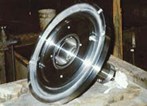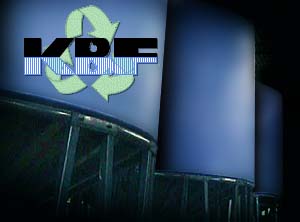Recycler Turns Sludge Waste into Gold

Since 1937, Walton and Lonsbury, Inc. (Attleboro, MA) has been engaged in chromium plating everything from printing press rollers to hydraulic pistons to plastic-film extrusion dies. Working with over 40,000 amperes of low-voltage direct current, their chromium plating is done in tanks ranging from 250 gallons to 1,100 gallons in capacities up to 14-feet in overall length, 30-inches in diameter and 4,000 lbs. in weight. These high-volume operations are conducted in an environmentally safe, closed-loop, zero discharge facility.
For many years, Walton and Lonsbury disposed of their sludge waste through Massachusetts-based firms specializing in waste management. But, they paid through the nose for these services through high taxation from the Massachusetts government. This lead to an investigation of other waste treatment firms, some out of state, to take care of the "mess." Walton and Lonsbury happened upon KBF Pollution Management, Inc. (Paterson, NJ), a company that not only recycles waste but turns it into a commodity to be sold by end users.

KBF's recycling and commodity manufacturing center employs the Selective Separation Technology (SST) and other proprietary processes to turn one company's waste into another company's sellable product. The SST Technology (US Patents 5,753,125; 5,908, 599) separates, removes and recovers metals from liquid and solid wastes among other types of media, according to KBF. The KBF patent sees faults with other removal methods. It contends that ion exchange media works slowly and involves complex and costly regeneration and metal recovery chemistry. It also requires large filter beds that make it impractical for large-volume waste water treatment. Electrolysis is also expensive, consumes large amounts of energy, requires significant maintenance, and is, at best, only 70-80% efficient, according to the patent.
Others have tried complexing agents, generally based on carbamates. KBF uses similar chemistry (based on thiocarbamates, dithiocarbamates or alkylthiocarbamates) in combination with an alkali and water. Its preferred mixture consists of (by weight) of 40% sodium dimethyldithiocarbamate, 10% caustic soda, and 50% water. This is also subject to modification. "The process is optimized for each customer's needs," says Kevin Kreisler, senior vice president at KBF. The company modified the percentages of the aforementioned complexing agents and added some additional proprietary chemistries to the mix to tailor the process to meet Walton & Lonsbury's needs. According to Kreisler, SST has also been modified for electroless nickel and electroless copper applications.
The SST technology basically works like this. After Walton & Lonsbury completes the chromium plating process, rinses the part, traps the chromic acid and transfers it to an authorized tanker, KBF receives the material into its facility. When the waste enters the plant, the company adjusts the pH, prepares the solution for the precipitation of metal ions by adding the complexing mixture to the fold, and then adds a particle growth enhancer. This promotes aggregation of the metal ions. Adding a flocculent makes the particles larger and allows the company to form a solution. Dewatering yields a sludge. After drying, KBF melts the sludge to selectively remove and recover materials.

According to Kreisler, the chemicals used in the process and the recycling procedure used are chosen based on the "back-end customer's needs." In other words, the recycling technique chosen will yield the best possible end product for the company purchasing the recycled metals. Many of these recovered metals are valuable. In fact, KBF claims sludge waste for metals are comparable or superior to the quality of virgin ore mined from the ground. The company says it can recover and resell hazardous and nonhazardous metals at highly competitive rates. This turns expense into a profit center. And that's just fine with Walton and Lonsbury. "This is a perfect example of taking waste and recycling it into a new product," says Robert Hogue, Walton and Lonsbury president.
The company also says its approach "eliminates the federally mandated ‘cradle-to-grave' liability for which a waste generator would otherwise remain perpetually liable." As a result, KBF has the ability to reduce both current waste disposal costs and the potential for future liability. Their recycling approach also helps their customers remain compliant with environmental regulations. "We're trying to be on the leading edge of compliance and on environmental issues," says Hogue.
In 1998, KBF treated 1.25 million gallons of metal-bearing liquid wastes and no solid waste. An expansion of its Paterson, NJ, waste treatment facility will boost its capacity to 15 million gal/yr of liquid waste and 50,000 st/yr of solid waste. KBF says the Northeast-New England area generates more than 46 million tons of recyclable metal-bearing industrial wastes annually.
KBF is also participating in a program administered by the Paterson Economic Development Corporation (PEDC) and funded by the New Jersey Department of Labor for the completion of training for ISO 9001 Certification for the company's recycling and commodity manufacturing center. According to KBF, "under the PEDC program, the company's employees will be trained in the relevant ISO requirements by an accredited third-party ISO consulting organization over a 15-month period." After this period, KBF will be ISO 9001 certified and will then apply for ISO 14001 Certification.
For another example of KBF's recycling and commodity manufacturing capabilities, please see "Sartomer Chooses Selective Separation For Recycling" on Surface Finishing.com's sister site, Chemical Online.
KBF Pollution Management, Inc., KBF Plaza, One Jasper Street, Paterson, NJ 07540. Phone (800) 366-1426; Fax (973) 942-7527.
Walton and Lonsbury, Inc., 78 North Avenue, PO Box 206, Attleboro, MA 02703-0206. Phone (508) 222-6900; Fax (508) 222-8253.
